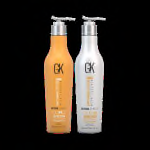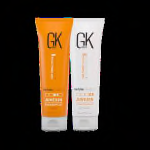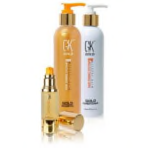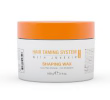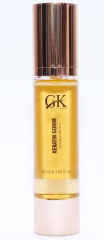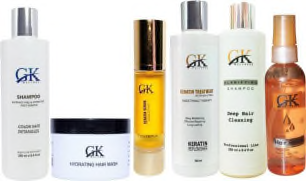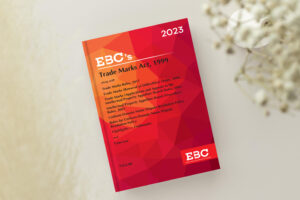Delhi High Court: Plaintiffs alleged that defendants’ mark “GK WELLNESS” and their logos ![]() and
and ![]() infringed plaintiffs’ registered trade mark “GK HAIR”, within the meaning of Section 29(2) of the Trade Marks Act, 1999 (‘the Act’). Thus, plaintiff seeks an interlocutory injunction against the use by defendants, in any manner, of the impugned mark “GK WELLNESS” and the logos
infringed plaintiffs’ registered trade mark “GK HAIR”, within the meaning of Section 29(2) of the Trade Marks Act, 1999 (‘the Act’). Thus, plaintiff seeks an interlocutory injunction against the use by defendants, in any manner, of the impugned mark “GK WELLNESS” and the logos ![]() and
and ![]() . C. Hari Shankar, J.*, held that defendants and others acting on their behalf, shall, consequently, stand restrained, pending disposal of the present suit, from using the mark “GK WELLNESS” in any form, including the logos
. C. Hari Shankar, J.*, held that defendants and others acting on their behalf, shall, consequently, stand restrained, pending disposal of the present suit, from using the mark “GK WELLNESS” in any form, including the logos ![]() ,
, ![]() , and any domain name of which “gk wellness” was a part, or any other mark which was confusingly or deceptively similar to plaintiffs’ registered trade mark “GK HAIR”, or for any goods or services dealing with hair care or hair treatment, or any other goods or services which were allied or cognate therewith.
, and any domain name of which “gk wellness” was a part, or any other mark which was confusingly or deceptively similar to plaintiffs’ registered trade mark “GK HAIR”, or for any goods or services dealing with hair care or hair treatment, or any other goods or services which were allied or cognate therewith.
Background
Plaintiff 1 was a company incorporated in Luxembourg and Plaintiff 2 was the exclusive distributor, in India, of Plaintiff 1’s products. Plaintiff 1 commenced selling its goods and products, under the mark “Global Keratin”, in 2007 and adopted and coined the mark “GK Hair” and the logo ![]() . Under the mark “GK HAIR”, plaintiffs not only market hair care products but also provide education to salon professionals regarding use of the products for nourishing of hair from the roots. The logo
. Under the mark “GK HAIR”, plaintiffs not only market hair care products but also provide education to salon professionals regarding use of the products for nourishing of hair from the roots. The logo ![]() was used for hair tanning products, hair care shampoo, conditioner, hair colours, hairspray, hair packs and other similar products.
was used for hair tanning products, hair care shampoo, conditioner, hair colours, hairspray, hair packs and other similar products.
Plaintiffs came to know in April 2021 that defendants were manufacturing and selling haircare products, similar to those of plaintiff, under the impugned marks “GK WELLNESS”, ![]() and
and ![]() . Plaintiffs condemned defendants’ marks as “blatant” and “slavish” imitations of plaintiffs’ registered trade mark “GK HAIR” and the logo
. Plaintiffs condemned defendants’ marks as “blatant” and “slavish” imitations of plaintiffs’ registered trade mark “GK HAIR” and the logo ![]() .
.
|
Plaintiffs’ products under mark “GK HAIR” |
Defendants’ products under mark “GK WELLNESS” |
Analysis, Law, and Decision
The Court did not accept Defendant 1’s contention that the mark ![]() was registered in favour of Defendant 1 and that, therefore, no action for infringement could lie against the said mark. The Court opined that registration of the mark
was registered in favour of Defendant 1 and that, therefore, no action for infringement could lie against the said mark. The Court opined that registration of the mark ![]() in Defendant 1’s favour, was granted in a manner contrary to the law as the
in Defendant 1’s favour, was granted in a manner contrary to the law as the ![]() mark was granted registration without considering plaintiff’s opposition, which was filed within time and thus, the grant of registration was itself prima facie invalid ab initio. The Court further opined that no right could flow, in law, from an illegal act and having obtained registration in a manner which contravened the statutory scheme, Defendant 1 could not claim, based on the said registration, either the exclusive right to use the mark, or a protection against any infringement action, as would otherwise be available under Section 30(2)(e) of the Act. Therefore, the Court opined that defendants could not plead registration of the mark
mark was granted registration without considering plaintiff’s opposition, which was filed within time and thus, the grant of registration was itself prima facie invalid ab initio. The Court further opined that no right could flow, in law, from an illegal act and having obtained registration in a manner which contravened the statutory scheme, Defendant 1 could not claim, based on the said registration, either the exclusive right to use the mark, or a protection against any infringement action, as would otherwise be available under Section 30(2)(e) of the Act. Therefore, the Court opined that defendants could not plead registration of the mark ![]() as a defence to the allegation of infringement, laid by plaintiffs.
as a defence to the allegation of infringement, laid by plaintiffs.
The issue for consideration was “whether the word mark “GK HAIR” was infringed by defendants “GK WELLNESS” word mark or the logo ![]() ?”.
?”.
The Court noted that Section 17(2)(a) of the Act clearly proscribed any claim of exclusivity in a part of a composite mark, where that part was not separately registered as a trade mark. Plaintiffs’ mark “GK HAIR” was a composite mark, composed of “GK” and “HAIR” and plaintiff had no registration for “GK” per se. Section 17(2)(a) of the Act, therefore, would not permit plaintiff to plead infringement by claiming exclusivity for the “GK” part of its “GK HAIR” mark. The Court thus opined that plaintiffs’ and defendants’ marks have, therefore, to be compared as a whole and “anti-dissection” rule would not apply in the present case.
The Court relied on South India Beverages (P) Ltd. v. General Mills Mktg. Inc., 2014 SCC OnLine Del 1953 and opined that since “GK” part of plaintiffs’ and defendants’ marks was common, there was likelihood of confusion or association in the minds of the public and thus, the Court held that defendants’ mark infringed plaintiffs’ mark. The Court opined that (a) the marks “GK HAIR” and “GK WELLNESS” were similar to each other, (b) were used for identical products, catering to same consumers and were available at same outlets and (c) there was prima facie likelihood of confusion in the mind of the consumer, or of the consumer believing an association between the marks. The Court held that because of these factors, the three ingredients which were required to be satisfied for infringement, within the meaning of Section 29(2)(b) of the Act were satisfied in the present case.
The Court noted that Section 17(2)(b) of the Act disallowed any claim to exclusivity, by the proprietor of a registered trade mark, in any matter, contained in the mark, which was common to the trade or was otherwise not distinctive. The Court relied on Pankaj Goel v. Dabur India Ltd., 2008 SCC OnLine Del 1744 and opined that to succeed in their contention that the acronym “GK” was common to the trade, defendants would have to produce substantial evidence to indicate considerable use, in the trade in which plaintiffs used their “GK HAIR” mark. A mere reference to a proliferation of marks, of which “GK” was a part, could not suffice to constitute a substantial defence predicated on Section 17(2)(b) of the Act.
The Court relied on Midas Hygiene Industries (P) Ltd. v. Sudhir Bhatia, (2004) 3 SCC 90, wherein the Supreme Court held that “where infringement was found, prima facie, to exist, an injunction, and nothing less, must follow. Delay in approaching the Court was also held not to be a factor inhibiting grant of injunction.”.
The Court opined that the balance of convenience was clearly in favour of plaintiffs, as defendants were using an infringing mark, and, while grant of injunction would only require defendants not to use a mark of which “GK” was a part, refusal of injunction would result in plaintiff having to tolerate continued infringement. Refusal of injunction would also be contrary to public interest, as there would be a likelihood of further confusion, in the public, between the products of defendants and plaintiffs because of similarity of the marks used by them.
The Court thus held that defendants and others acting on their behalf, shall, consequently, stand restrained, pending disposal of the present suit, from using the mark “GK WELLNESS” in any form, including the logos ![]() ,
, ![]() , and any domain name of which “gk wellness” was a part, or any other mark which was confusingly or deceptively similar to plaintiffs’ registered trade mark “GK HAIR”, or for any goods or services dealing with hair care or hair treatment, or any other goods or services which were allied or cognate therewith.
, and any domain name of which “gk wellness” was a part, or any other mark which was confusingly or deceptively similar to plaintiffs’ registered trade mark “GK HAIR”, or for any goods or services dealing with hair care or hair treatment, or any other goods or services which were allied or cognate therewith.
[Van Tibolli v. K. Srinivas Rao, 2023 SCC OnLine Del 8384, decided on 26-12-2023]
*Judgment authored by: Justice C. Hari Shankar
Advocates who appeared in this case :
For the Plaintiffs: Gaurav Barathi, Muskan Arora, Vishal Shrivastava, Advocates
For the Defendants: Joshini Tuli, Joginder Tuli, Shrikant Sharma, Ishu Sharma, Kirti Goyal, Advocates



